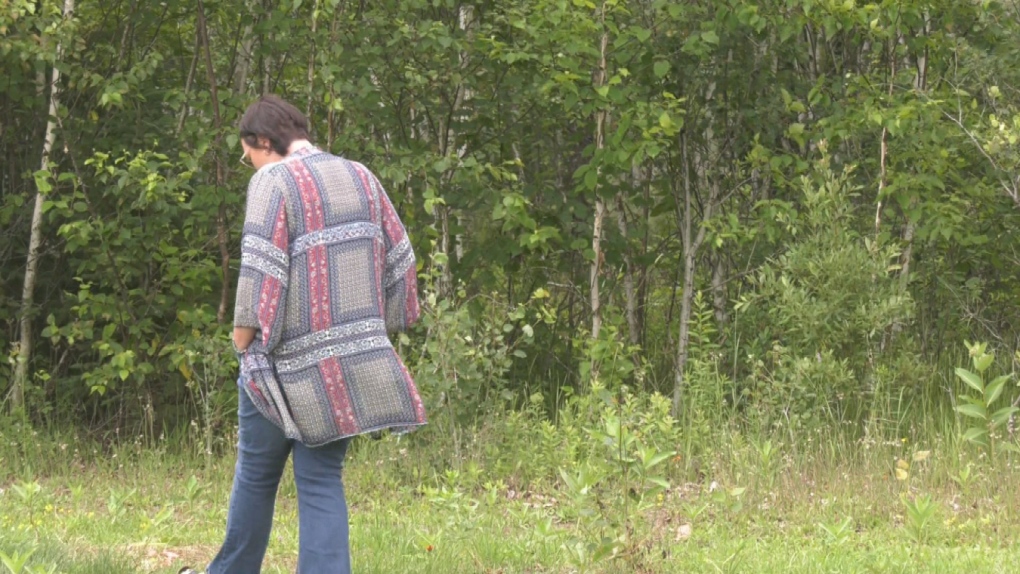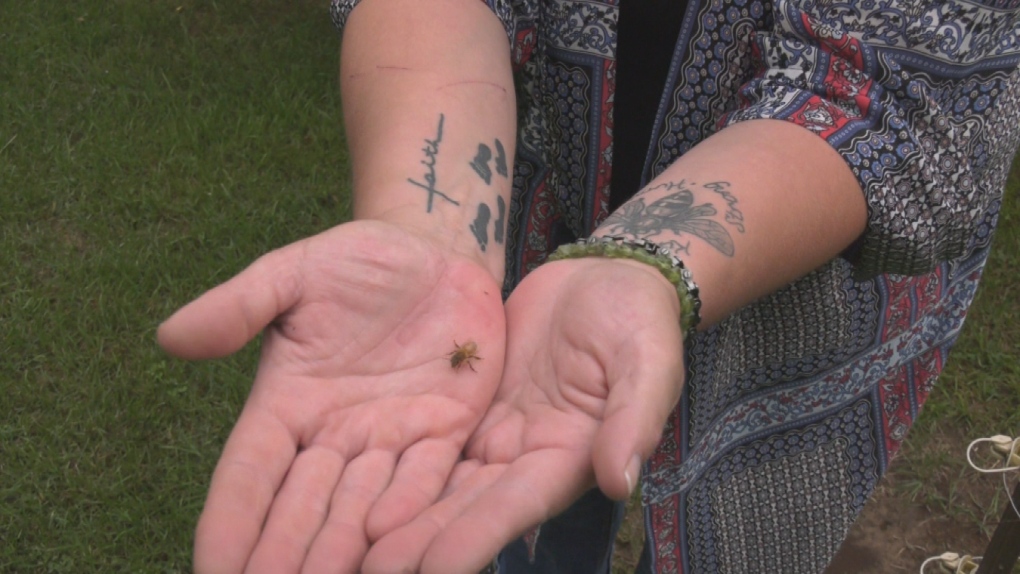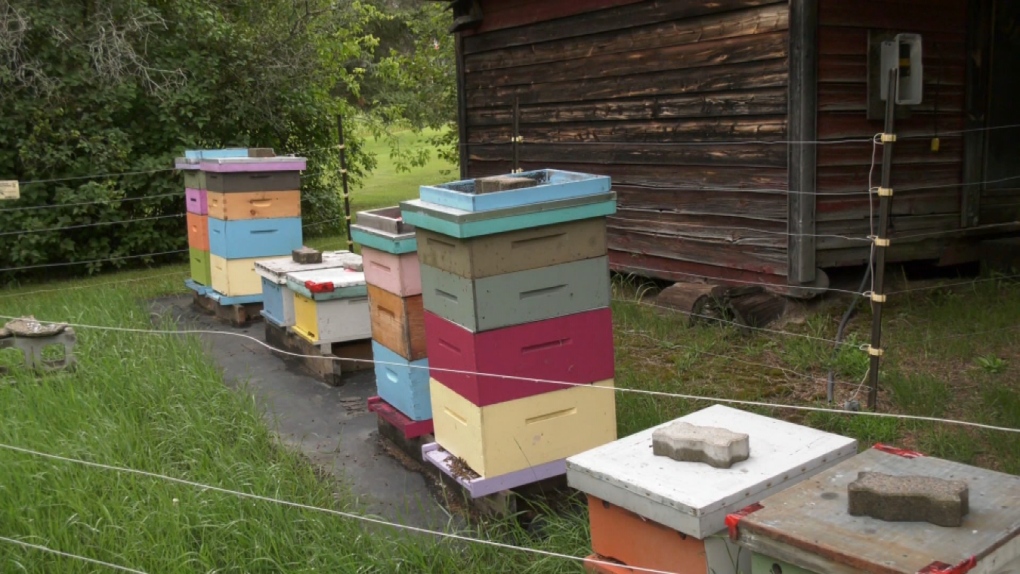Northern Ontario beekeeper says she lost nearly 2 million bees this season
In June, CTV News Northern Ontario told the story of a Greater Sudbury area beekeeper who lost half of her bee population – about 1.5 million bees, due to what she believed was an acute chemical kill.
 Northern Ontario beekeeper Dawn Lalonde walking through fields that were once a buzz with bees after losing more than 1 million bees from her colonies in June 2024. (File photo/Lyndsay Aelick/CTV News Northern Ontario)
Northern Ontario beekeeper Dawn Lalonde walking through fields that were once a buzz with bees after losing more than 1 million bees from her colonies in June 2024. (File photo/Lyndsay Aelick/CTV News Northern Ontario)
Now, testing done at the University of Guelph’s Agriculture and Food Laboratory has confirmed that was the case.
“I still fear walking out into my yard today, tomorrow, if these companies come and spray within the residential areas, within anywhere from three miles of me, that the it's going to be another day like it was in July, August. It doesn't stop,” said beekeeper Dawn Lalonde.
“It's not just one and I know it's not just one company and I'm not here to point fingers and place blame these products, if used correctly, can be done safely for protection of our food sources. Unfortunately, in my opinion, and this is my opinion, cosmetic green lawns is the new monoculture of the north and it's not a food source.”
Lalonde is the owner-operator of Mikkola Family Farm & Apiary and the True North Honey Company. She told CTV News that since the last time our cameras caught up with her she has experienced even more loss and has now lost almost 2 million bees in total.
 Dawn Lalonde speaks with CTV News over Zoom about her loss of about 2 million bees in the Greater Sudbury-area in the last three months. September 13, 2024. (Lyndsay Aelick/CTV News Northern Ontario)
Dawn Lalonde speaks with CTV News over Zoom about her loss of about 2 million bees in the Greater Sudbury-area in the last three months. September 13, 2024. (Lyndsay Aelick/CTV News Northern Ontario)
“This is not just about myself or the 200 and some beekeepers just in the Sudbury district,” she said.
“This is our native pollinators. My bees, like my colleagues have said in previous articles, is my bees are the canary in the coal mine. There is a problem here, a catastrophic environmental problem that is about to come down on us that wasn't there five years ago.”
 Northern Ontario beekeeper Dawn Lalonde holding one of more than 1 million bees that suddenly died in June 2024. Lalonde believes the mass deaths were caused by chemical toxicity. (File photo/Lyndsay Aelick/CTV News Northern Ontario)
Northern Ontario beekeeper Dawn Lalonde holding one of more than 1 million bees that suddenly died in June 2024. Lalonde believes the mass deaths were caused by chemical toxicity. (File photo/Lyndsay Aelick/CTV News Northern Ontario)
Costly testing
Thanks to more than $10,000 raised through a GoFundMe initiative, Lalonde was able to send her bees away for testing and while she won’t specify which chemicals were found in the bees she did say there was a variety of fungicides as well as pesticides.
“If my math is correct, it did exceed the Ld50, which is the lethal dose of pyrethroids that were in the on the bee sample as one of the bee samples,” she said.
“That was the fresher one here as well as within the pollen within my colonies. So I will say that, yes, there was something that did show up. Now who used it? How it was applied. That is up to the ministry to find out.”
Ontario Ministry of the Environment investigating
In a statement to CTV News, a spokesperson for the province’s Ministry of the Environment, Conservation and Parks said in part:
“Ministry staff are following up with local commercial pesticide operators to assess whether any local residential pesticide applications took place around the time of the June 14, 2024 bee kill. We are assessing the available information to help determine what may have caused the bee kill and will get back to the business owner when that assessment is complete.”
 A collection of bee colonies in the Greater Sudbury community of Lively that recently lost more than 1 million bees in June 2024. (File photo/Lyndsay Aelick/CTV News Northern Ontario)
A collection of bee colonies in the Greater Sudbury community of Lively that recently lost more than 1 million bees in June 2024. (File photo/Lyndsay Aelick/CTV News Northern Ontario)
Lalonde said she intends to rebuild, relocate and continue to educate and advocate. She currently has 15 original surviving colonies preparing to go into winter – a number she said should be more than 75.
CTVNews.ca Top Stories

BREAKING Donald Trump picks former U.S. congressman Pete Hoekstra as ambassador to Canada
U.S. president-elect Donald Trump has nominated former diplomat and U.S. congressman Pete Hoekstra to be the American ambassador to Canada.
Genetic evidence backs up COVID-19 origin theory that pandemic started in seafood market
A group of researchers say they have more evidence to suggest the COVID-19 pandemic started in a Chinese seafood market where it spread from infected animals to humans. The evidence is laid out in a recent study published in Cell, a scientific journal, nearly five years after the first known COVID-19 outbreak.
This is how much money you need to make to buy a house in Canada's largest cities
The average salary needed to buy a home keeps inching down in cities across Canada, according to the latest data.
'My two daughters were sleeping': London Ont. family in shock after their home riddled with gunfire
A London father and son they’re shocked and confused after their home was riddled with bullets while young children were sleeping inside.
Smuggler arrested with 300 tarantulas strapped to his body
Police in Peru have arrested a man caught trying to leave the country with 320 tarantulas, 110 centipedes and nine bullet ants strapped to his body.
Boissonnault out of cabinet to 'focus on clearing the allegations,' Trudeau announces
Prime Minister Justin Trudeau has announced embattled minister Randy Boissonnault is out of cabinet.
Baby dies after being reported missing in midtown Toronto: police
A four-month-old baby is dead after what Toronto police are calling a “suspicious incident” at a Toronto Community Housing building in the city’s midtown area on Wednesday afternoon.
Sask. woman who refused to provide breath sample did not break the law, court finds
A Saskatchewan woman who refused to provide a breath sample after being stopped by police in Regina did not break the law – as the officer's request was deemed not lawful given the circumstances.
Parole board reverses decision and will allow families of Paul Bernardo's victims to attend upcoming parole hearing in person
The families of the victims of Paul Bernardo will be allowed to attend the serial killer’s upcoming parole hearing in person, the Parole Board of Canada (PBC) says.


































